Business Report: Analyzing the Challenges of HRM in a Globalized World
VerifiedAdded on 2023/01/23
|7
|1490
|51
Report
AI Summary
This report explores the significant impact of globalization on human resource management (HRM), focusing on the challenges faced by multinational organizations. It delves into crucial issues such as cultural differences among employees from diverse backgrounds, which can lead to conflicts in the workplace. It also addresses the complexities arising from varying taxation policies and employment legislations across different countries, requiring HR departments to adapt and create new policies. Furthermore, the report highlights the communication challenges that arise from operating in multiple locations, often relying on technology, which can lead to misunderstandings. The report then provides recommendations, including fostering a strong organizational culture that values employee opinions, improving communication skills, and gaining a deeper understanding of international labor laws and taxation policies to mitigate these challenges. The report concludes by emphasizing the importance of proactive HRM strategies to navigate the complexities of a globalized business environment.
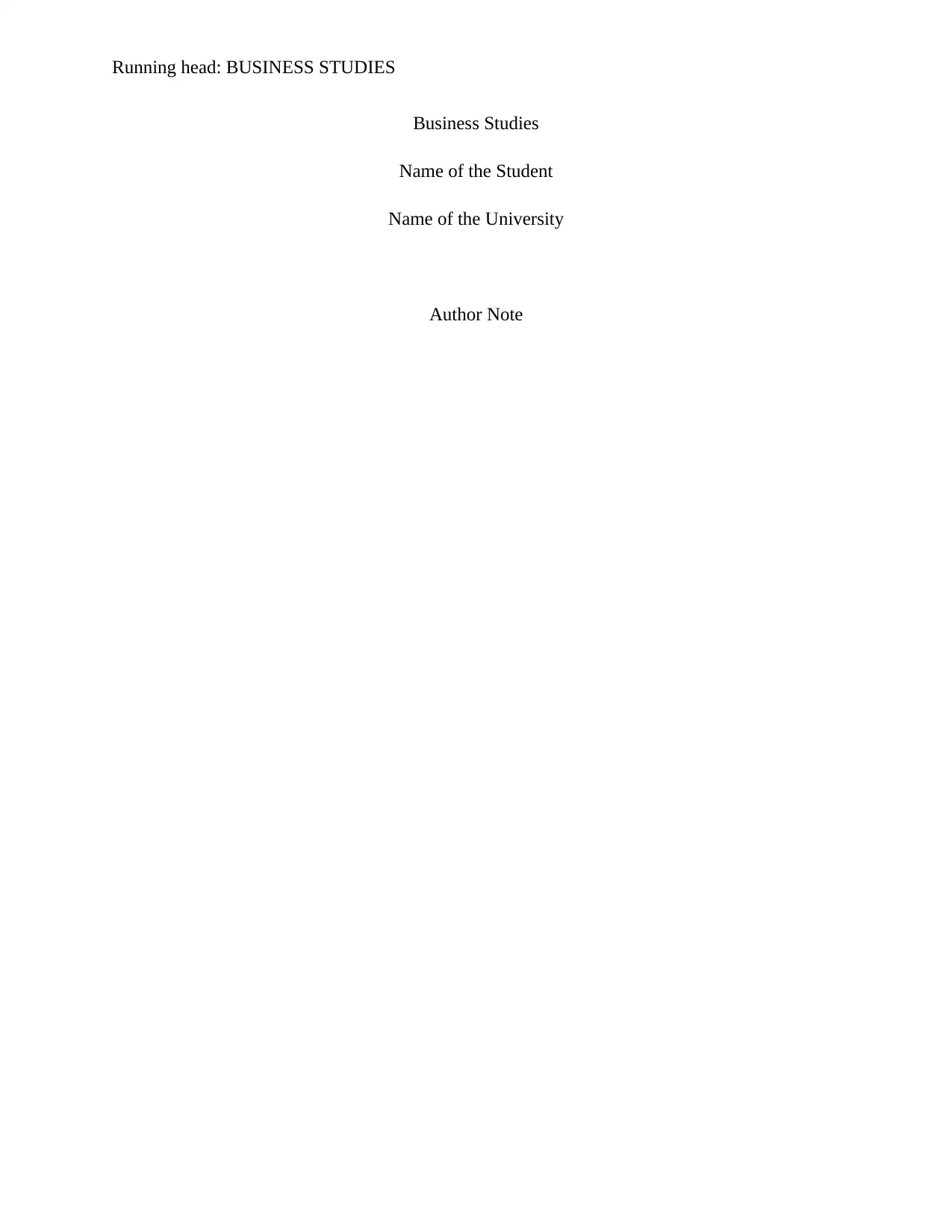
Running head: BUSINESS STUDIES
Business Studies
Name of the Student
Name of the University
Author Note
Business Studies
Name of the Student
Name of the University
Author Note
Paraphrase This Document
Need a fresh take? Get an instant paraphrase of this document with our AI Paraphraser
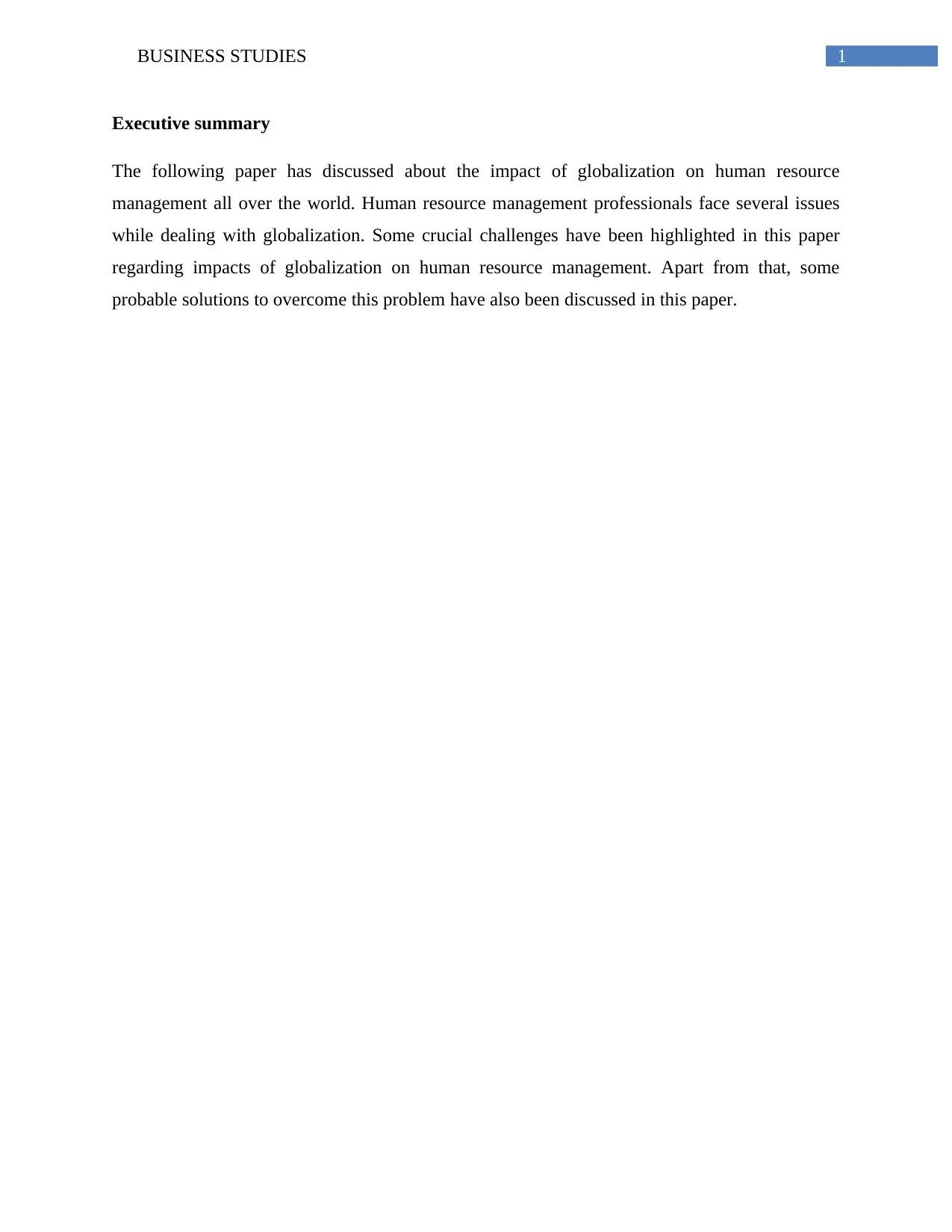
1BUSINESS STUDIES
Executive summary
The following paper has discussed about the impact of globalization on human resource
management all over the world. Human resource management professionals face several issues
while dealing with globalization. Some crucial challenges have been highlighted in this paper
regarding impacts of globalization on human resource management. Apart from that, some
probable solutions to overcome this problem have also been discussed in this paper.
Executive summary
The following paper has discussed about the impact of globalization on human resource
management all over the world. Human resource management professionals face several issues
while dealing with globalization. Some crucial challenges have been highlighted in this paper
regarding impacts of globalization on human resource management. Apart from that, some
probable solutions to overcome this problem have also been discussed in this paper.
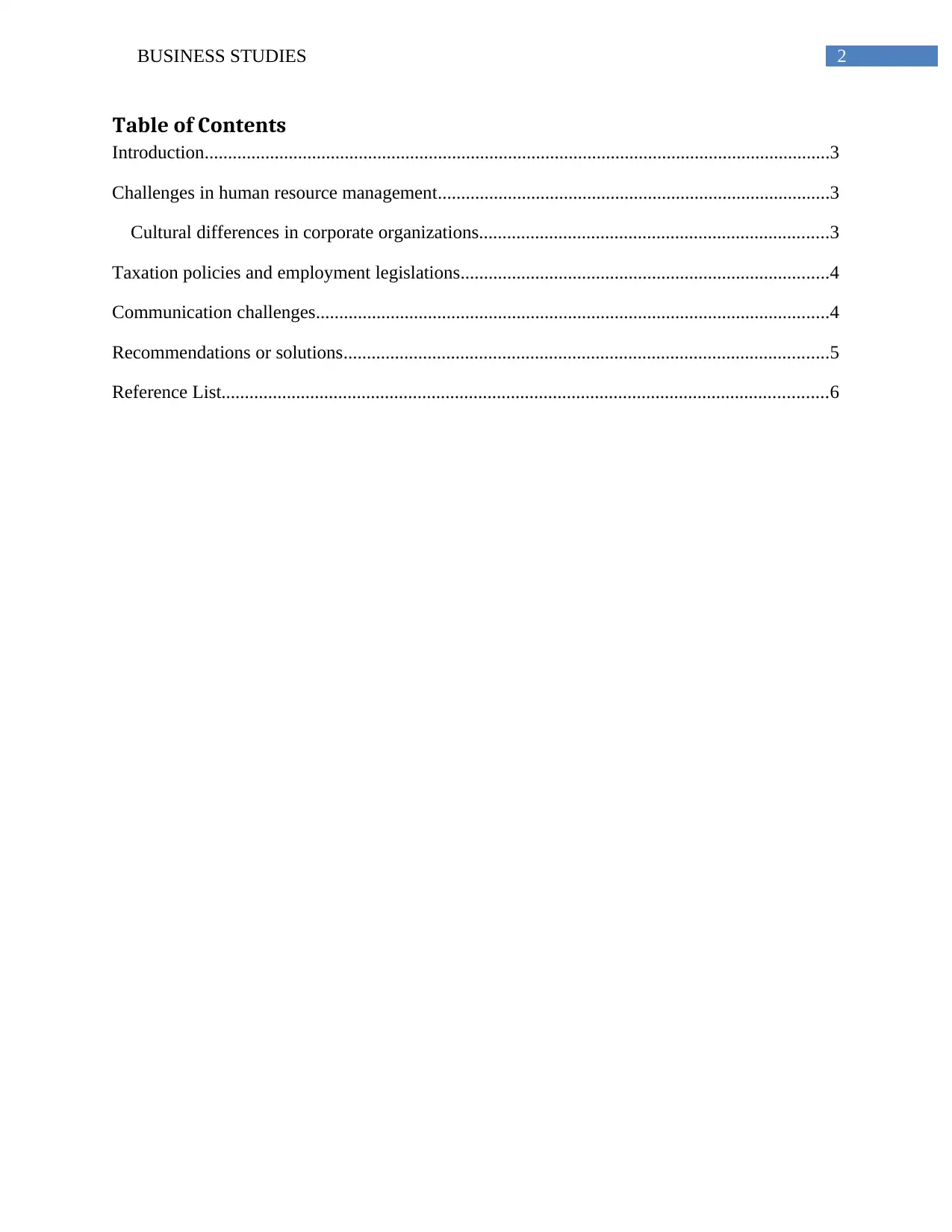
2BUSINESS STUDIES
Table of Contents
Introduction......................................................................................................................................3
Challenges in human resource management....................................................................................3
Cultural differences in corporate organizations...........................................................................3
Taxation policies and employment legislations...............................................................................4
Communication challenges..............................................................................................................4
Recommendations or solutions........................................................................................................5
Reference List..................................................................................................................................6
Table of Contents
Introduction......................................................................................................................................3
Challenges in human resource management....................................................................................3
Cultural differences in corporate organizations...........................................................................3
Taxation policies and employment legislations...............................................................................4
Communication challenges..............................................................................................................4
Recommendations or solutions........................................................................................................5
Reference List..................................................................................................................................6
⊘ This is a preview!⊘
Do you want full access?
Subscribe today to unlock all pages.

Trusted by 1+ million students worldwide
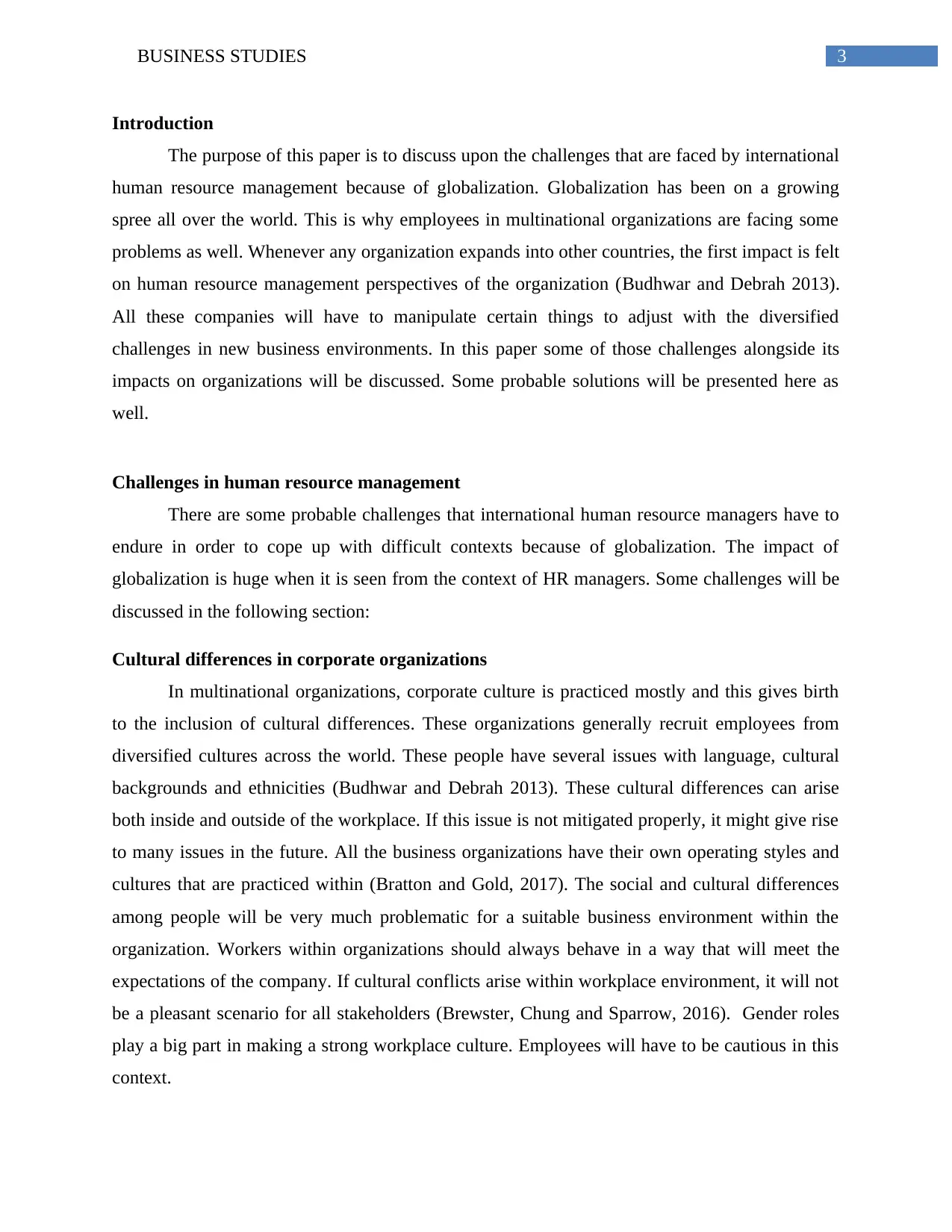
3BUSINESS STUDIES
Introduction
The purpose of this paper is to discuss upon the challenges that are faced by international
human resource management because of globalization. Globalization has been on a growing
spree all over the world. This is why employees in multinational organizations are facing some
problems as well. Whenever any organization expands into other countries, the first impact is felt
on human resource management perspectives of the organization (Budhwar and Debrah 2013).
All these companies will have to manipulate certain things to adjust with the diversified
challenges in new business environments. In this paper some of those challenges alongside its
impacts on organizations will be discussed. Some probable solutions will be presented here as
well.
Challenges in human resource management
There are some probable challenges that international human resource managers have to
endure in order to cope up with difficult contexts because of globalization. The impact of
globalization is huge when it is seen from the context of HR managers. Some challenges will be
discussed in the following section:
Cultural differences in corporate organizations
In multinational organizations, corporate culture is practiced mostly and this gives birth
to the inclusion of cultural differences. These organizations generally recruit employees from
diversified cultures across the world. These people have several issues with language, cultural
backgrounds and ethnicities (Budhwar and Debrah 2013). These cultural differences can arise
both inside and outside of the workplace. If this issue is not mitigated properly, it might give rise
to many issues in the future. All the business organizations have their own operating styles and
cultures that are practiced within (Bratton and Gold, 2017). The social and cultural differences
among people will be very much problematic for a suitable business environment within the
organization. Workers within organizations should always behave in a way that will meet the
expectations of the company. If cultural conflicts arise within workplace environment, it will not
be a pleasant scenario for all stakeholders (Brewster, Chung and Sparrow, 2016). Gender roles
play a big part in making a strong workplace culture. Employees will have to be cautious in this
context.
Introduction
The purpose of this paper is to discuss upon the challenges that are faced by international
human resource management because of globalization. Globalization has been on a growing
spree all over the world. This is why employees in multinational organizations are facing some
problems as well. Whenever any organization expands into other countries, the first impact is felt
on human resource management perspectives of the organization (Budhwar and Debrah 2013).
All these companies will have to manipulate certain things to adjust with the diversified
challenges in new business environments. In this paper some of those challenges alongside its
impacts on organizations will be discussed. Some probable solutions will be presented here as
well.
Challenges in human resource management
There are some probable challenges that international human resource managers have to
endure in order to cope up with difficult contexts because of globalization. The impact of
globalization is huge when it is seen from the context of HR managers. Some challenges will be
discussed in the following section:
Cultural differences in corporate organizations
In multinational organizations, corporate culture is practiced mostly and this gives birth
to the inclusion of cultural differences. These organizations generally recruit employees from
diversified cultures across the world. These people have several issues with language, cultural
backgrounds and ethnicities (Budhwar and Debrah 2013). These cultural differences can arise
both inside and outside of the workplace. If this issue is not mitigated properly, it might give rise
to many issues in the future. All the business organizations have their own operating styles and
cultures that are practiced within (Bratton and Gold, 2017). The social and cultural differences
among people will be very much problematic for a suitable business environment within the
organization. Workers within organizations should always behave in a way that will meet the
expectations of the company. If cultural conflicts arise within workplace environment, it will not
be a pleasant scenario for all stakeholders (Brewster, Chung and Sparrow, 2016). Gender roles
play a big part in making a strong workplace culture. Employees will have to be cautious in this
context.
Paraphrase This Document
Need a fresh take? Get an instant paraphrase of this document with our AI Paraphraser
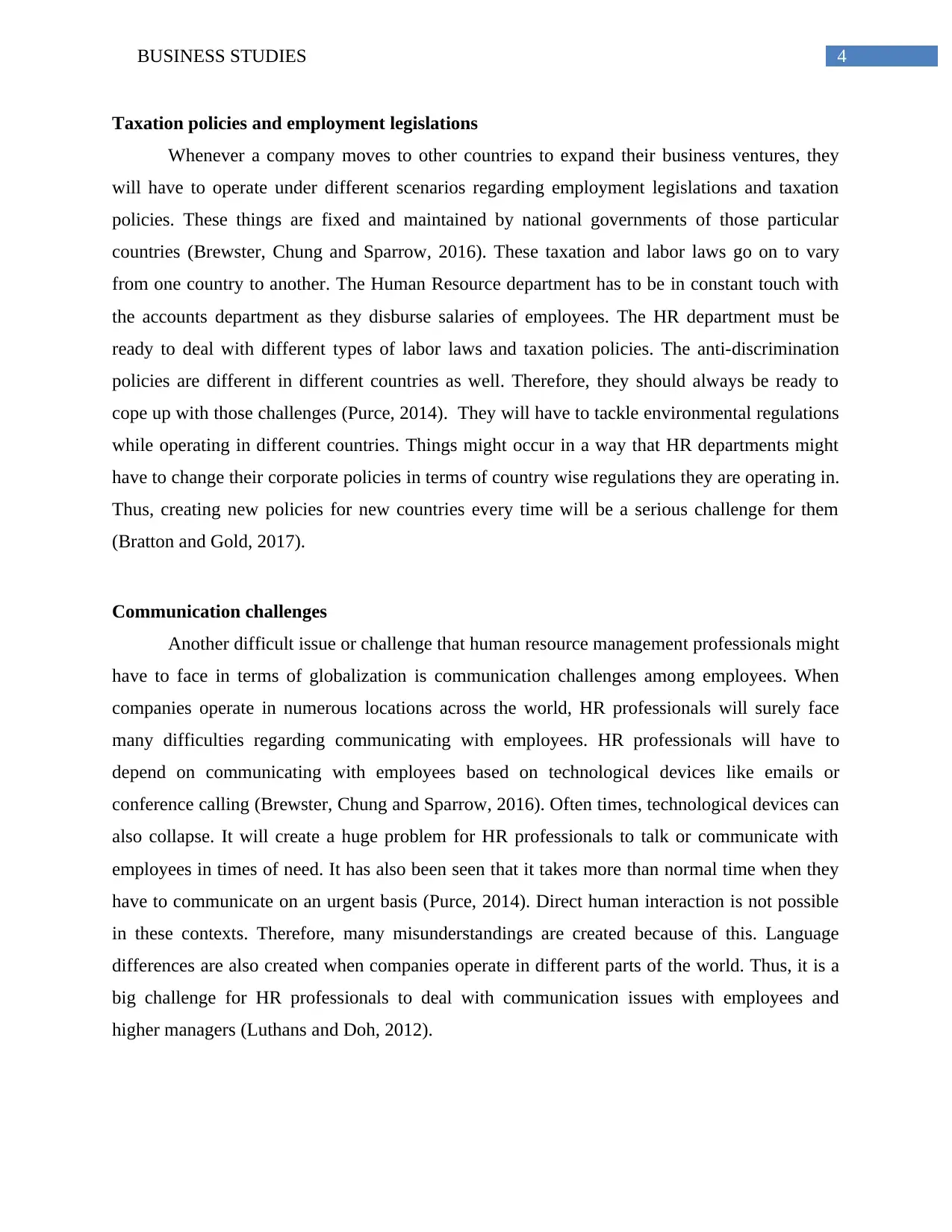
4BUSINESS STUDIES
Taxation policies and employment legislations
Whenever a company moves to other countries to expand their business ventures, they
will have to operate under different scenarios regarding employment legislations and taxation
policies. These things are fixed and maintained by national governments of those particular
countries (Brewster, Chung and Sparrow, 2016). These taxation and labor laws go on to vary
from one country to another. The Human Resource department has to be in constant touch with
the accounts department as they disburse salaries of employees. The HR department must be
ready to deal with different types of labor laws and taxation policies. The anti-discrimination
policies are different in different countries as well. Therefore, they should always be ready to
cope up with those challenges (Purce, 2014). They will have to tackle environmental regulations
while operating in different countries. Things might occur in a way that HR departments might
have to change their corporate policies in terms of country wise regulations they are operating in.
Thus, creating new policies for new countries every time will be a serious challenge for them
(Bratton and Gold, 2017).
Communication challenges
Another difficult issue or challenge that human resource management professionals might
have to face in terms of globalization is communication challenges among employees. When
companies operate in numerous locations across the world, HR professionals will surely face
many difficulties regarding communicating with employees. HR professionals will have to
depend on communicating with employees based on technological devices like emails or
conference calling (Brewster, Chung and Sparrow, 2016). Often times, technological devices can
also collapse. It will create a huge problem for HR professionals to talk or communicate with
employees in times of need. It has also been seen that it takes more than normal time when they
have to communicate on an urgent basis (Purce, 2014). Direct human interaction is not possible
in these contexts. Therefore, many misunderstandings are created because of this. Language
differences are also created when companies operate in different parts of the world. Thus, it is a
big challenge for HR professionals to deal with communication issues with employees and
higher managers (Luthans and Doh, 2012).
Taxation policies and employment legislations
Whenever a company moves to other countries to expand their business ventures, they
will have to operate under different scenarios regarding employment legislations and taxation
policies. These things are fixed and maintained by national governments of those particular
countries (Brewster, Chung and Sparrow, 2016). These taxation and labor laws go on to vary
from one country to another. The Human Resource department has to be in constant touch with
the accounts department as they disburse salaries of employees. The HR department must be
ready to deal with different types of labor laws and taxation policies. The anti-discrimination
policies are different in different countries as well. Therefore, they should always be ready to
cope up with those challenges (Purce, 2014). They will have to tackle environmental regulations
while operating in different countries. Things might occur in a way that HR departments might
have to change their corporate policies in terms of country wise regulations they are operating in.
Thus, creating new policies for new countries every time will be a serious challenge for them
(Bratton and Gold, 2017).
Communication challenges
Another difficult issue or challenge that human resource management professionals might
have to face in terms of globalization is communication challenges among employees. When
companies operate in numerous locations across the world, HR professionals will surely face
many difficulties regarding communicating with employees. HR professionals will have to
depend on communicating with employees based on technological devices like emails or
conference calling (Brewster, Chung and Sparrow, 2016). Often times, technological devices can
also collapse. It will create a huge problem for HR professionals to talk or communicate with
employees in times of need. It has also been seen that it takes more than normal time when they
have to communicate on an urgent basis (Purce, 2014). Direct human interaction is not possible
in these contexts. Therefore, many misunderstandings are created because of this. Language
differences are also created when companies operate in different parts of the world. Thus, it is a
big challenge for HR professionals to deal with communication issues with employees and
higher managers (Luthans and Doh, 2012).
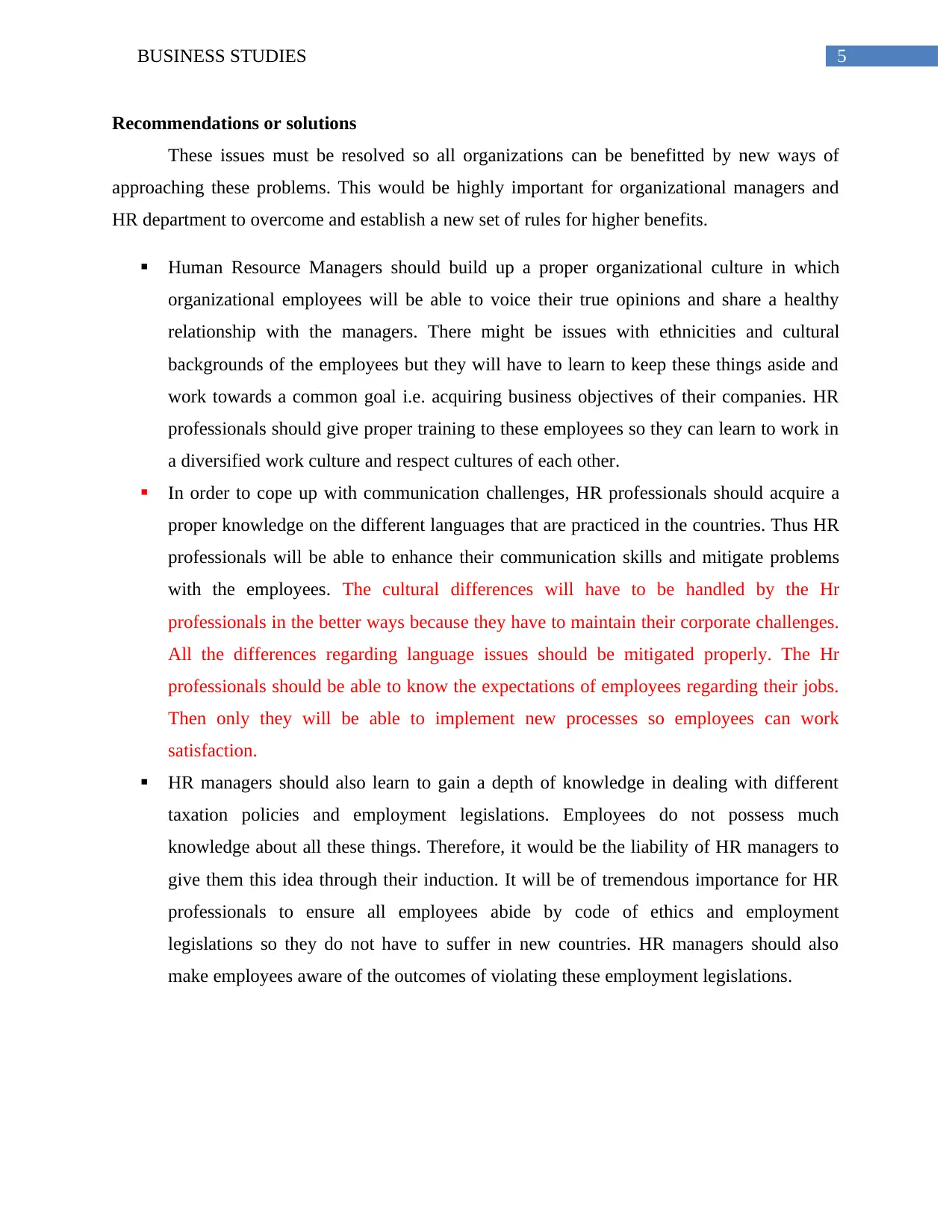
5BUSINESS STUDIES
Recommendations or solutions
These issues must be resolved so all organizations can be benefitted by new ways of
approaching these problems. This would be highly important for organizational managers and
HR department to overcome and establish a new set of rules for higher benefits.
Human Resource Managers should build up a proper organizational culture in which
organizational employees will be able to voice their true opinions and share a healthy
relationship with the managers. There might be issues with ethnicities and cultural
backgrounds of the employees but they will have to learn to keep these things aside and
work towards a common goal i.e. acquiring business objectives of their companies. HR
professionals should give proper training to these employees so they can learn to work in
a diversified work culture and respect cultures of each other.
In order to cope up with communication challenges, HR professionals should acquire a
proper knowledge on the different languages that are practiced in the countries. Thus HR
professionals will be able to enhance their communication skills and mitigate problems
with the employees. The cultural differences will have to be handled by the Hr
professionals in the better ways because they have to maintain their corporate challenges.
All the differences regarding language issues should be mitigated properly. The Hr
professionals should be able to know the expectations of employees regarding their jobs.
Then only they will be able to implement new processes so employees can work
satisfaction.
HR managers should also learn to gain a depth of knowledge in dealing with different
taxation policies and employment legislations. Employees do not possess much
knowledge about all these things. Therefore, it would be the liability of HR managers to
give them this idea through their induction. It will be of tremendous importance for HR
professionals to ensure all employees abide by code of ethics and employment
legislations so they do not have to suffer in new countries. HR managers should also
make employees aware of the outcomes of violating these employment legislations.
Recommendations or solutions
These issues must be resolved so all organizations can be benefitted by new ways of
approaching these problems. This would be highly important for organizational managers and
HR department to overcome and establish a new set of rules for higher benefits.
Human Resource Managers should build up a proper organizational culture in which
organizational employees will be able to voice their true opinions and share a healthy
relationship with the managers. There might be issues with ethnicities and cultural
backgrounds of the employees but they will have to learn to keep these things aside and
work towards a common goal i.e. acquiring business objectives of their companies. HR
professionals should give proper training to these employees so they can learn to work in
a diversified work culture and respect cultures of each other.
In order to cope up with communication challenges, HR professionals should acquire a
proper knowledge on the different languages that are practiced in the countries. Thus HR
professionals will be able to enhance their communication skills and mitigate problems
with the employees. The cultural differences will have to be handled by the Hr
professionals in the better ways because they have to maintain their corporate challenges.
All the differences regarding language issues should be mitigated properly. The Hr
professionals should be able to know the expectations of employees regarding their jobs.
Then only they will be able to implement new processes so employees can work
satisfaction.
HR managers should also learn to gain a depth of knowledge in dealing with different
taxation policies and employment legislations. Employees do not possess much
knowledge about all these things. Therefore, it would be the liability of HR managers to
give them this idea through their induction. It will be of tremendous importance for HR
professionals to ensure all employees abide by code of ethics and employment
legislations so they do not have to suffer in new countries. HR managers should also
make employees aware of the outcomes of violating these employment legislations.
⊘ This is a preview!⊘
Do you want full access?
Subscribe today to unlock all pages.

Trusted by 1+ million students worldwide
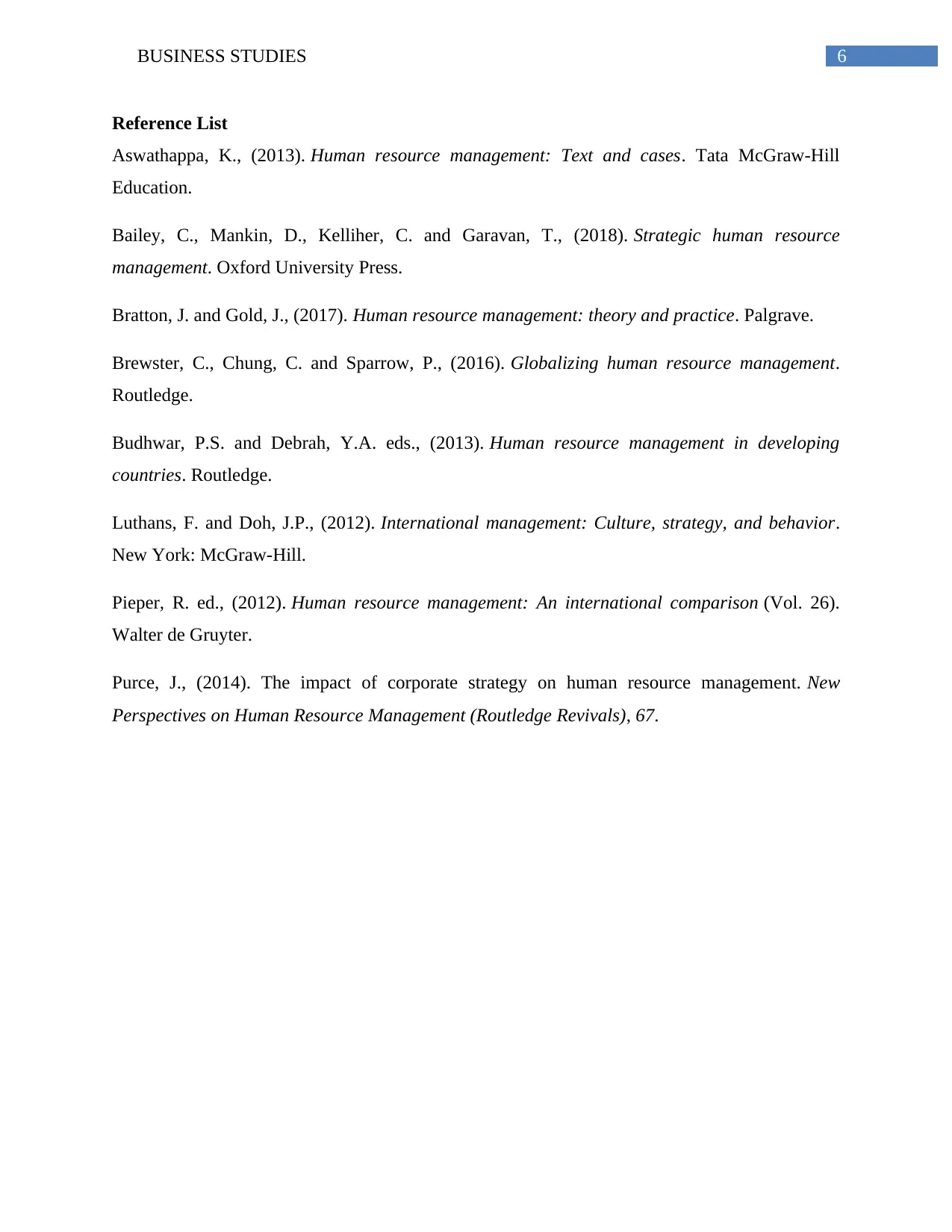
6BUSINESS STUDIES
Reference List
Aswathappa, K., (2013). Human resource management: Text and cases. Tata McGraw-Hill
Education.
Bailey, C., Mankin, D., Kelliher, C. and Garavan, T., (2018). Strategic human resource
management. Oxford University Press.
Bratton, J. and Gold, J., (2017). Human resource management: theory and practice. Palgrave.
Brewster, C., Chung, C. and Sparrow, P., (2016). Globalizing human resource management.
Routledge.
Budhwar, P.S. and Debrah, Y.A. eds., (2013). Human resource management in developing
countries. Routledge.
Luthans, F. and Doh, J.P., (2012). International management: Culture, strategy, and behavior.
New York: McGraw-Hill.
Pieper, R. ed., (2012). Human resource management: An international comparison (Vol. 26).
Walter de Gruyter.
Purce, J., (2014). The impact of corporate strategy on human resource management. New
Perspectives on Human Resource Management (Routledge Revivals), 67.
Reference List
Aswathappa, K., (2013). Human resource management: Text and cases. Tata McGraw-Hill
Education.
Bailey, C., Mankin, D., Kelliher, C. and Garavan, T., (2018). Strategic human resource
management. Oxford University Press.
Bratton, J. and Gold, J., (2017). Human resource management: theory and practice. Palgrave.
Brewster, C., Chung, C. and Sparrow, P., (2016). Globalizing human resource management.
Routledge.
Budhwar, P.S. and Debrah, Y.A. eds., (2013). Human resource management in developing
countries. Routledge.
Luthans, F. and Doh, J.P., (2012). International management: Culture, strategy, and behavior.
New York: McGraw-Hill.
Pieper, R. ed., (2012). Human resource management: An international comparison (Vol. 26).
Walter de Gruyter.
Purce, J., (2014). The impact of corporate strategy on human resource management. New
Perspectives on Human Resource Management (Routledge Revivals), 67.
1 out of 7
Related Documents
Your All-in-One AI-Powered Toolkit for Academic Success.
+13062052269
info@desklib.com
Available 24*7 on WhatsApp / Email
![[object Object]](/_next/static/media/star-bottom.7253800d.svg)
Unlock your academic potential
Copyright © 2020–2026 A2Z Services. All Rights Reserved. Developed and managed by ZUCOL.





